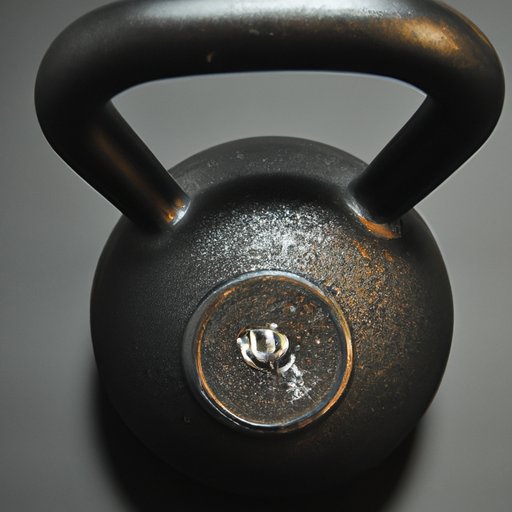
Introduction
Kettlebells were originally used by the Russian army to improve overall fitness, strength, and endurance. The popularity of this ancient training tool has exploded in recent years, thanks to its versatility and effectiveness. Kettlebells are a type of weight that is shaped like a cannonball with a handle. They come in a range of sizes and weights, allowing users to perform a variety of exercises that target different muscle groups.
One of the most common problems people face when using kettlebells is choosing the right weight. Many beginners make the mistake of choosing a weight that is too heavy, which can increase the risk of injury and prevent progress. In this article, we will help you choose the right kettlebell weight for your fitness goals.
How to Choose the Right Kettlebell Weight for Your Fitness Goals
The key to choosing the right kettlebell weight is to set clear fitness goals. Do you want to build strength, increase endurance, or lose weight? Different kettlebell weights are best used for different fitness objectives. Consider the following:
- 8 kg (~18 lbs): Ideal for beginners, individuals with limited strength, or those performing high-rep exercises like swings or lunges.
- 12 kg (~26 lbs): Ideal for women with prior fitness experience or men with limited strength who are performing high-rep exercises like swings or lunges.
- 16 kg (~35 lbs): Ideal for men with prior fitness experience or women with excellent strength who are performing moderate to high-intensity exercises like presses, rows, and squats.
- 20 kg (~44 lbs): Ideal for advanced users with significant strength who are performing more demanding exercises like Turkish get-ups, snatches, and cleans.
It’s important to remember that these weights are just guidelines. Body weight, experience, and fitness level are all factors that will impact the appropriate weight choice. We recommend consulting a personal trainer or physician before starting a new fitness program.
The Benefits of Starting with a Lighter Kettlebell Weight
One of the biggest advantages of starting with a lighter kettlebell weight is that it can help build proper form and reduce the risk of injury. Proper form is essential to getting the most from your workout while minimizing the risk of injury. Starting with a lighter weight allows you to focus on proper form and technique, which will benefit you in the long run.
A lighter weight also allows you to perform more repetitions, which can help build endurance and cardiovascular fitness. This can be beneficial for individuals looking to lose weight or increase overall fitness level.
Why a Heavier Kettlebell Weight May Not Be Better
Many people assume that lifting a heavier weight is always better. However, this is not necessarily true when it comes to kettlebells. Technique and form are crucial when using kettlebells, and lifting a weight that is too heavy can increase the risk of injury.
It’s important to challenge yourself, but not at the expense of proper technique. Lifting a weight that is too heavy can also lead to frustration and prevent progress. Start with a weight that is manageable and gradually increase as your strength and fitness levels improve.
The Science Behind Choosing the Perfect Kettlebell Weight
Research has shown that choosing the right kettlebell weight can have a significant impact on the effectiveness of your workout. Different weights can be used to target different muscle groups and build strength in different areas of the body. Understanding the science behind choosing a weight can help you make better choices for your fitness goals.
In general, heavier weights are used to build strength and power, while lighter weights are used to build endurance and cardiovascular fitness. However, selecting the right weight is not just about the body part you’re targeting. It’s essential to also consider the movement pattern and biomechanics required for each exercise.
Breaking Down the Factors That Influence Your Kettlebell Weight Choice
Several factors can influence your kettlebell weight choice. These include strength level, gender, body weight, and experience level. For example, women may find it better to start with a lighter weight than men due to body composition and strength differences.
Strength level is another crucial factor. Individuals with limited strength should start with a lighter weight and focus on building proper form and technique. Advanced users with significant strength may need to start with a heavier weight or progress to a heavier weight more quickly.
Conclusion
Choosing the right kettlebell weight is essential to achieving your fitness goals safely and effectively. Remember to start with a weight that is manageable and gradually increase as your strength and determination improves. Consult a personal trainer or physician before starting a new fitness program. With the right guidance, kettlebells can be an excellent tool for building strength and endurance.





